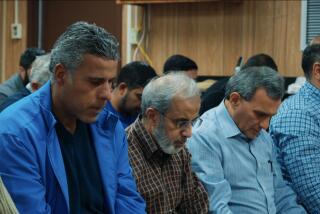A Country Doctor Faces the Era of AIDS : BOOK REVIEW / NONFICTION : MY OWN COUNTRY, A Doctor’s Story of a Town and Its People in the Age of AIDS <i> By Abraham Verghese</i> . Simon & Schuster: $23, 347 pages
The world is indeed a small and interrelated place.
In hopes of finding a good environment to raise his children, Abraham Verghese, an Indian internist born in Ethiopia and trained in the United States, accepted a position at a VA hospital in Johnson City, Tenn. The job included an auxiliary appointment at the adjacent medical center (known locally as the Miracle Center), and without intending it, Verghese found himself “AIDS doctor” for a rural enclave that encompassed a large part of south-central Appalachia.
Cross-culturally, this circumstance is not as unusual as it might first appear. The staff physicians in the tiny community hospitals that served the scattered mining towns of southwest Virginia, east Tennessee and Kentucky were predominantly from India or the Philippines with a smattering of Pakistanis, Koreans and Palestinians.
As an outsider, part of an expatriate professional population distinctive as much for its advanced education as for its foreign origins, Verghese initially turns a clinically dispassionate observer’s gaze on his patients.
Gradually, however, he feels at least spiritually (if not ethnically) integrated into the region, and comes to develop a number of close and enduring relationships with those men and women he treats who are HIV positive.
“I suppose,” he writes, “this is when you know that a town has become your town: where others see brick, a broken window, a boarded up storefront, you feel either moved to tears or to joy. The map of the town becomes the map of our memories, the grid on which you play out your obsessions, on which you mark your great loves and your enmities; its geography becomes your destiny.”
In a series of interesting, if not terribly compelling portraits, we meet the Johnsons, a patrician and very Christian husband and wife, senior citizens who are convinced that AIDS comes from the devil and not from God.
We encounter a series of gay men, some flamboyant, others tightly closeted, others married or involved in long-term relationships, who deal with their encroaching ailments with varying degrees of courage and anger.
Most memorable of all is Vickie, a muscular, heavyset woman who is revealed, beneath her fierce exterior, to possess a sweet and generous quality that enables her to accept her fate with surprising equanimity and dignity. Infected by her bisexual husband--whom she nursed until his death--she is capable of propelling sentimentality into a kind of bravery.
“ ‘Doc, before you go . . . let me show you something,’ she said after returning from taking her husband, infirm and half in dementia, on his last trips to the Grand Old Opry and the Knoxville Zoo. She pointed out a shrub on the other side of the road with red flowers on it. ‘Do you know what that is?”
” ’. . .It’s called hearts-a-bustin’ ,’ ‘ Vickie said. She nodded emphatically when I looked at her in disbelief. ‘Oh yes, hearts-a-bustin’ . It’s also called ‘swamp dogwood,’ but I don’t care for that much. Hearts-a-bustin’: that’s pretty much how I feel sometimes about what’s happening to me.’ ”
As a subtext to medical and social documentary aspects of “My Own Country,” Verghese reveals the distancing he experiences in his marriage. He emerges as a lonely, non-judgmental man, a doctor whose natural instinct to heal is thwarted by the inexorable nature of the disease he must battle.
While “My Own Country” is a fascinating book in many respects--establishing, among other things, the pervasive spread of AIDS into the hinterlands of America, “imported by native sons who had left long ago and were now returning because of HIV infection”--it is somehow also less gripping that it should be. There’s an illusive detachment here, an over-intellectualizing, as if Verghese keeps certain strong emotions at bay even from himself.
“Was my egalitarianism nothing but a cover-up for a deeply rooted prejudice? Was my outward proletarianism, my disdain for what I saw as the avarice of modern medicine, my compassion for gay men and for the underdog in general, merely a posture?
“If so, this posture was costly: It was responsible for the increasing sense of isolation I felt from my community, even from my wife.
“By taking up the cause of AIDS, I had become tainted, the associations for this word had tarnished me, I often felt as ‘guilty’ as the kind of people I cared for. Perhaps this was why I was so drawn to the Johnsons, the ‘innocents’: they were an affirmation of my self-worth, of my innocence.”
We come away from “My Own Country” with an abiding admiration for the good and compassionate work Dr. Verghese has conducted, but also with a regret that he did not more fully address in this memoir the tough questions that he posed to himself.
More to Read
Sign up for our Book Club newsletter
Get the latest news, events and more from the Los Angeles Times Book Club, and help us get L.A. reading and talking.
You may occasionally receive promotional content from the Los Angeles Times.









